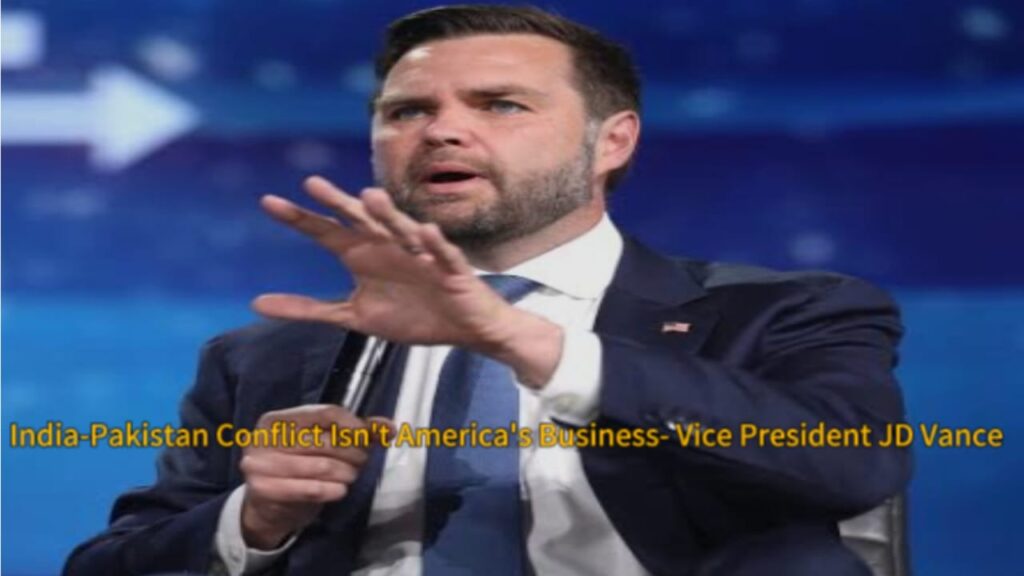JD Vance ignited a firestorm during a foreign policy forum in Washington D.C. when he declared the long-standing India-Pakistan conflict as “fundamentally none of our business” and asserted that the United States has “nothing to do with America’s ability to control it.” Vance, known for his nationalist rhetoric, framed the regional hostility as a “sovereign matter between two nuclear-armed neighbors” and insisted that continuous American involvement only complicates global diplomacy.
JD Vance emphasized that America must shift away from what he termed “imperial entanglements” and “Cold War-era thinking.” He argued that U.S. foreign policy should prioritize issues of direct national security and economic relevance. His remarks immediately drew sharp criticism from both hawkish members of Congress and international observers who view South Asia as a critical zone of geopolitical tension.
Rising Concerns Over Nuclear Stability in South Asia
JD Vance acknowledged the grave risks posed by the India-Pakistan conflict, especially considering both nations possess nuclear arsenals. However, he downplayed America’s role in preventing escalation, stating, “The illusion that we can manage or contain every global conflict is not only arrogant but dangerous.” Vance pointed to past U.S. interventions that failed to produce lasting peace, such as in Afghanistan and Iraq, as cautionary examples.
Analysts argue that minimizing U.S. engagement could destabilize the region further. Many believe America has historically served as a backchannel mediator during flare-ups in Kashmir. Critics warn that without U.S. diplomatic pressure, there is a higher probability of miscalculation between the two rivals. Nonetheless, Vance doubled down on his belief that the nations must “own their conflict and its consequences.”
Indian and Pakistani Officials React with Unease

JD Vance’s comments drew a cautious yet pointed response from both New Delhi and Islamabad. Indian officials expressed disappointment, suggesting that the U.S. should remain “invested in the region’s strategic stability.” Pakistan, meanwhile, saw the statement as validation of its long-standing narrative that international players often show selective interest in South Asia based on convenience, not principle.
JD Vance, in a follow-up interview, maintained that America cannot be the “global referee.” He stated, “Both countries must chart a path to peace or bear the consequences of perpetual hostility. That’s not America’s burden to carry.” These remarks have left regional analysts questioning whether the Trump administration’s foreign policy doctrine is experiencing a radical internal shift.
Republican and Democratic Lawmakers Clash Over Implications
JD Vance’s remarks have deepened the ideological rift in Washington. While some Republican lawmakers hailed his approach as “realist and refreshing,” centrist Democrats warned it could harm America’s credibility as a global peacebroker. Senate Foreign Relations Committee members from both parties have requested closed-door briefings on the administration’s updated South Asia strategy.
Leading Democratic voices like Senator Chris Murphy criticized Vance’s “reckless detachment,” asserting that America’s disengagement could create a vacuum for China to increase its influence in the subcontinent. In contrast, GOP figures like Senator Josh Hawley defended Vance’s position, arguing that America’s military and diplomatic bandwidth is already overstretched.
China and Russia Seize the Opportunity for Influence
JD Vance’s declaration may inadvertently open doors for rival powers. Chinese state media responded swiftly, highlighting America’s “waning interest” in Asian affairs. Beijing’s Ministry of Foreign Affairs even issued a statement implying that China could play a more “active role” in fostering regional dialogue between India and Pakistan—an assertion that has alarmed U.S. allies.
Similarly, Russian diplomats praised Vance’s remarks as “evidence of declining American hegemony,” and proposed that Moscow could serve as a neutral moderator in future negotiations. Critics argue that such geopolitical shifts could threaten U.S. strategic interests in the Indian Ocean and erode existing military partnerships.
What This Means for the Future of U.S. Foreign Policy
JD Vance’s comments are seen by many as a harbinger of an evolving American doctrine that prioritizes domestic interests over global engagement. His “non-interventionist realism” resonates with an increasingly war-weary public but raises serious questions about the long-term implications for international stability and U.S. influence.
As foreign policy elites assess the fallout, one thing is clear: Vance has thrust the India-Pakistan conflict into the spotlight not by offering solutions, but by withdrawing expectations. Whether this approach strengthens or weakens America’s global standing remains a contentious debate. For now, his words have etched a bold line in the sand, signaling a potential pivot that may redefine U.S. diplomacy in the decades to come.














